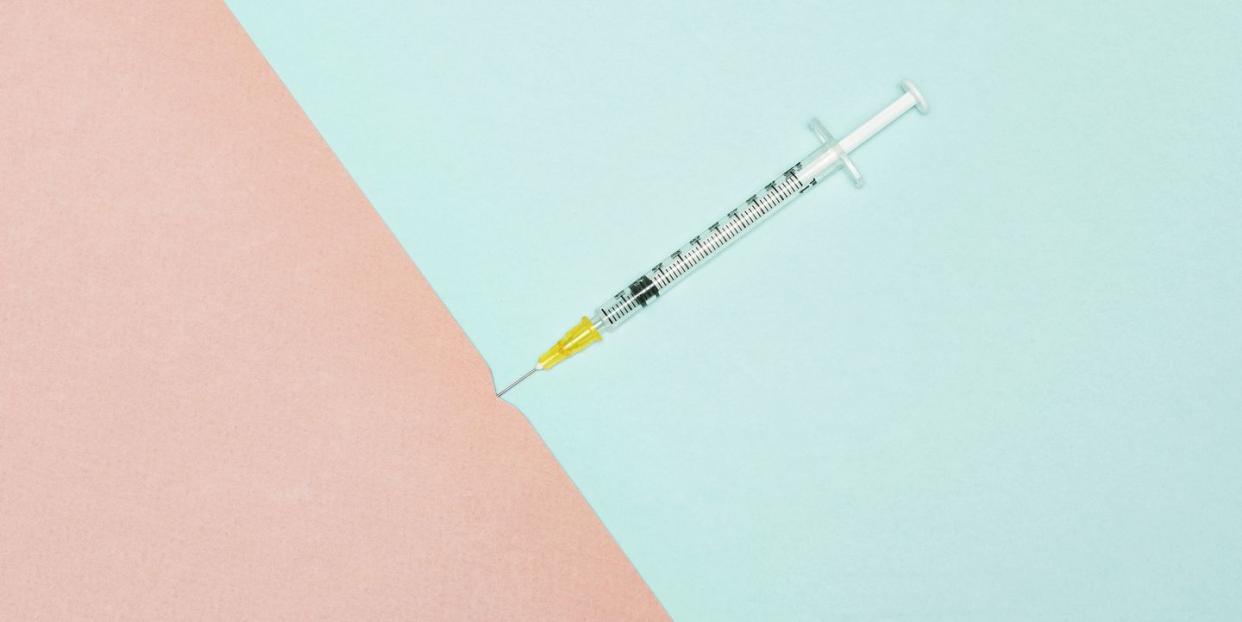How to find out if you'll be eligible for the COVID-19 vaccination

Yesterday, we heard the groundbreaking news that a COVID-19 vaccination has been found to prevent more than 90% of people from getting the virus. But when will the jab be made available, and who will be offered the vaccine first in the UK?
In mass testing across six different countries, the vaccine made by Pfizer and BioNTech showed no safety concerns, and looks to be approved for use subject to some final tests. Health Secretary Matt Hancock has said the NHS will be ready to distribute it 'as fast as safely possible,' with hopes the protection may start being rolled out as soon as December this year.
Speaking at a Downing Street press conference yesterday, Deputy Chief Medical Officer Professor Jonathan Van-Tam described the development as 'a very important scientific breakthrough.' We know the UK has already ordered 40 million doses of the Pfizer jab, which will be enough to vaccinate up to 20 million people (because each person will require two doses). That covers almost a third of the population, so who will be eligible to get the vaccine first?
In a move that will surprise precisely no-one, Van-Tam said age would be the 'biggest priority' when working out who would be offered the vaccine first. And quite rightly so; coronavirus is known to pose a greater risk the older you are. Earlier this year, during the first wave of the pandemic, over-70s were requested to shield for several months regardless of any pre-existing health conditions.

The government's vaccine task-force has already drawn up a list of who will be eligible for the vaccination first. And, while this might be subject to change according to the specific characteristics of the vaccine (that information is yet to be released), it gives a pretty good idea of who's going to be prioritised. As you'll see, young people who don't work in the health/caring professions or who don't have any high-risk health issues are way down the list - and may not actually be offered a vaccine at all.
Who will be offered the COVID-19 vaccine first?
Older adults' resident in a care home and care home workers
All those 80 years of age and over, and health and social care workers
All those 75 years of age and over
All those 70 years of age and over
All those 65 years of age and over
High-risk adults under 65 years of age
Moderate-risk adults under 65 years of age
All those 60 years of age and over
All those 55 years of age and over
All those 50 years of age and over
Rest of the population (priority to be determined)
It's clear that your average healthy 20-or-30-something in the UK is at the bottom of the pile where coronavirus vaccines are concerned, and it makes sense as to why — we're the least in need. But according to Kate Bingham, who heads up the government's vaccine task force, there aren't necessarily plans for us ever to get vaccinated.
Speaking to the FT last month, Bingham said that vaccinating everyone in the country was 'not going to happen.' She added: 'We just need to vaccinate everyone at risk.'
She went on to explain that the government is aiming to vaccinate around 30 million people out of the UK population of about 67m. 'People keep talking about 'time to vaccinate the whole population', but that is misguided,' she said. 'There’s going to be no vaccination of people under 18. It’s an adult-only vaccine, for people over 50, focusing on health workers and care home workers and the vulnerable.'

More is still to be learned about the Pfizer vaccination, including whether those who have had the vaccination but come into contact with COVID could still have the ability to spread it. But if that's not the case, then in theory all it will take is a proportion of the population - and not everyone — to be vaccinated to slow the spread of the virus right down and overcome the pandemic.
But whether you're likely to get vaccinated or not, I think the one thing we can all agree on is that yesterday's development is very good news in terms of getting our lives back on track. Thank F for that.
The information in this story is accurate as of the publication date. While we are attempting to keep our content as up-to-date as possible, the situation surrounding the coronavirus pandemic continues to develop rapidly, so it's possible that some information and recommendations may have changed since publishing. For any concerns and latest advice, visit the World Health Organisation. If you're in the UK, the National Health Service can also provide useful information and support, while US users can contact the Center for Disease Control and Prevention.
Subscribe to Red now to get the magazine delivered to your door.
Like this article? Sign up to our newsletter to get more articles like this delivered straight to your inbox.
You Might Also Like



